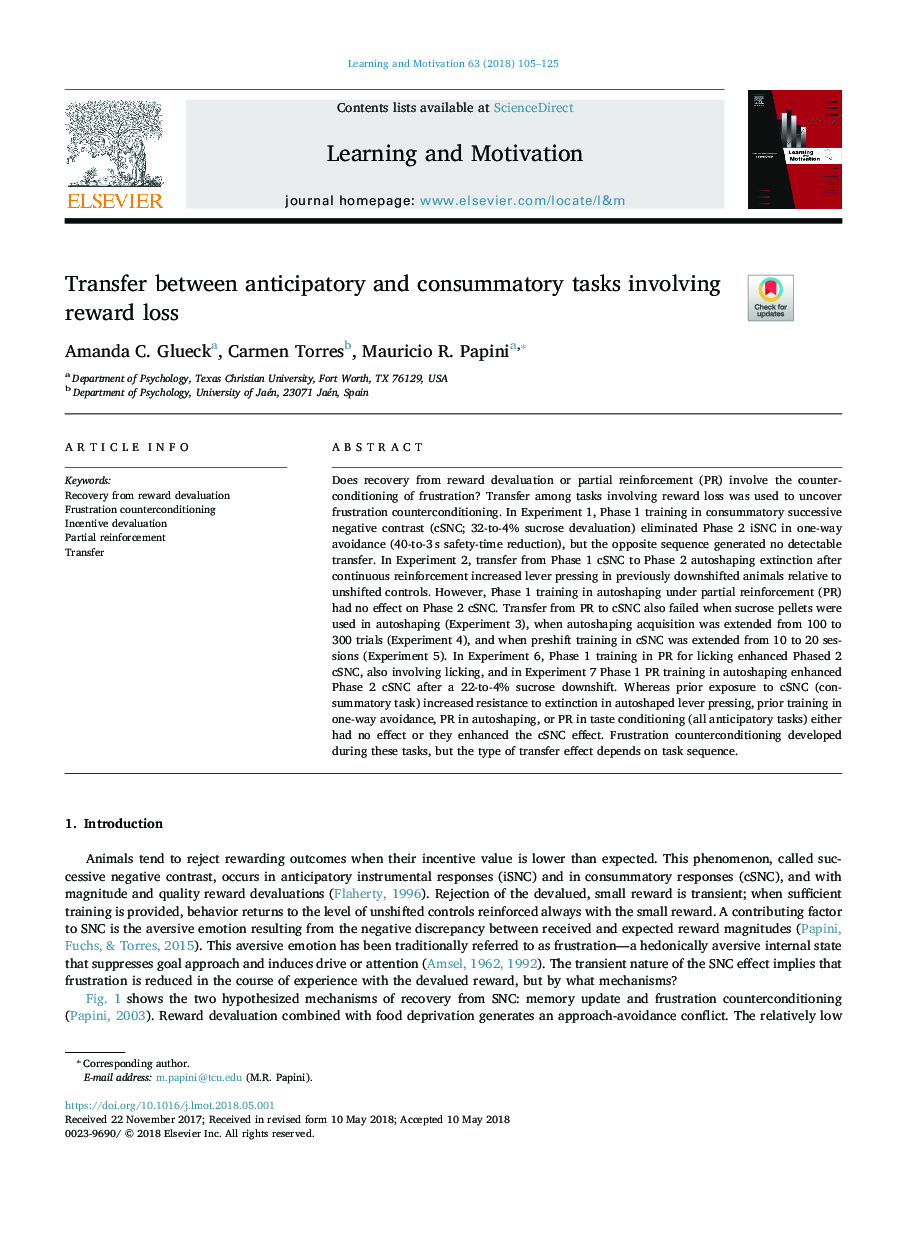| کد مقاله | کد نشریه | سال انتشار | مقاله انگلیسی | نسخه تمام متن |
|---|---|---|---|---|
| 7275696 | 1473505 | 2018 | 21 صفحه PDF | دانلود رایگان |
عنوان انگلیسی مقاله ISI
Transfer between anticipatory and consummatory tasks involving reward loss
ترجمه فارسی عنوان
انتقال بین وظایف پیشگیرانه و کارآزموده ای که شامل تلفات پاداش هستند
دانلود مقاله + سفارش ترجمه
دانلود مقاله ISI انگلیسی
رایگان برای ایرانیان
کلمات کلیدی
بازیابی از کاهش ارزش پاداش، ضد تهدید شدن، کاهش ارزش افزوده، تقویت جزئی، منتقل کردن،
موضوعات مرتبط
علوم زیستی و بیوفناوری
علم عصب شناسی
علوم اعصاب رفتاری
چکیده انگلیسی
Does recovery from reward devaluation or partial reinforcement (PR) involve the counterconditioning of frustration? Transfer among tasks involving reward loss was used to uncover frustration counterconditioning. In Experiment 1, Phase 1 training in consummatory successive negative contrast (cSNC; 32-to-4% sucrose devaluation) eliminated Phase 2 iSNC in one-way avoidance (40-to-3â¯s safety-time reduction), but the opposite sequence generated no detectable transfer. In Experiment 2, transfer from Phase 1 cSNC to Phase 2 autoshaping extinction after continuous reinforcement increased lever pressing in previously downshifted animals relative to unshifted controls. However, Phase 1 training in autoshaping under partial reinforcement (PR) had no effect on Phase 2 cSNC. Transfer from PR to cSNC also failed when sucrose pellets were used in autoshaping (Experiment 3), when autoshaping acquisition was extended from 100 to 300 trials (Experiment 4), and when preshift training in cSNC was extended from 10 to 20 sessions (Experiment 5). In Experiment 6, Phase 1 training in PR for licking enhanced Phased 2 cSNC, also involving licking, and in Experiment 7 Phase 1 PR training in autoshaping enhanced Phase 2 cSNC after a 22-to-4% sucrose downshift. Whereas prior exposure to cSNC (consummatory task) increased resistance to extinction in autoshaped lever pressing, prior training in one-way avoidance, PR in autoshaping, or PR in taste conditioning (all anticipatory tasks) either had no effect or they enhanced the cSNC effect. Frustration counterconditioning developed during these tasks, but the type of transfer effect depends on task sequence.
ناشر
Database: Elsevier - ScienceDirect (ساینس دایرکت)
Journal: Learning and Motivation - Volume 63, August 2018, Pages 105-125
Journal: Learning and Motivation - Volume 63, August 2018, Pages 105-125
نویسندگان
Amanda C. Glueck, Carmen Torres, Mauricio R. Papini,
